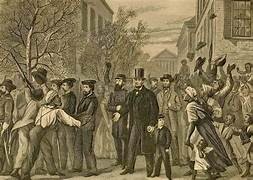Post Civil War
COMMUNITY
Post-Civil War
[edit]
The Civil War changed the social, economic, and political situation in Rock Hill tremendously, as it did elsewhere in the South. Rock Hill grew as a town, taking in war refugees, widows and their families, and the return of the men who had left to fight in the war.[9]: 58 The formerly wealthy elite sold off their land to stay afloat financially. Town life would begin to become more important than rural life.
Most of the merchants in Rock Hill around 1870 were former Confederate soldiers; many were entrepreneurs who were new to town, trying to start over.[9]: 59 In 1870, even the largest stores in Rock Hill were only one story tall, and there were no sidewalks along the roads. The first drug store in Rock Hill opened in the 1870s.[9]: 61 A locally contentious bordello was built in 1881 and introduced the town's first paved sidewalk.[9]: 61


Incorporation
The town was not officially incorporated until 1870, on the third try.
The first attempt to get Rock Hill incorporated was made in 1855. A petition, signed by major landholders and businessmen from the Rock Hill area, was presented to the General Assembly on October 19, 1855.[9]: 29 No action on the matter was taken by the General Assembly.
The second attempt was in 1868. In their petition, the townspeople claimed that Rock Hill had over 300 residents, "eleven stores, two churches, two bars, two hotels, two carriage shops, three blacksmith shops, three shoe shops, one tannery, one cabinet shop, and elementary schools for white girls and boys." The petition was signed by 48 men, most relative newcomers to Rock Hill, with only a few members of the old, established, landed families. The larger landholders opposed incorporation because of the taxes it would bring. They filed a counter-proposal which claimed that there were only 100 residents, many of them temporary.[9]: 63 The situation was a strong indication of the changes Rock Hill experienced as it transitioned from mostly farms to a business community. Ultimately, the state legislature did not act on either petition and Rock Hill was still not incorporated.
The third, successful petition was made in 1869, only one year after 1868's failed petition. This time there were 57 signers in favor of incorporation, with only seven opponents. The opponents collectively owned 80% of the land that would be incorporated into Rock Hill if the petition was successful. They were unsuccessful at preventing incorporation this time; Rock Hill was officially incorporated on February 26, 1870.[9]: 64



